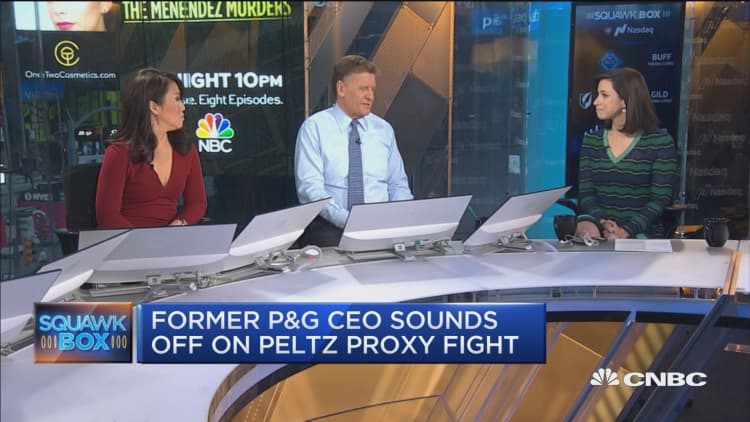
Former chairman and CEO of Procter & Gamble A.G. Lafley has come to the vocal defense of the consumer packaged goods giant as it gears up for the largest proxy vote in history.
Lafley's former employer is embroiled in a battle with Nelson Peltz, whose fund Trian Partners has taken a $3.5 billion stake in P&G and is seeking a board seat. The battle is set to come to a head on Oct. 10, when the company holds its annual meeting.
In the letter, Lafley has some harsh words for both Peltz and Clayton Daley, who was Lafley's CFO for a time and was hired by Trian to run the fight.
Lafley has not been in touch with Daley since he joined Peltz's campaign, he confirmed in an interview with CNBC. He spoke highly of Daley's tenure as CFO, though suggested Daley suffered memory lapses when critiquing P&G's sale of its beauty business and corporate structure.
"Mr. Peltz (and Mr. Daley) are clearly out for number one," Lafley wrote in a letter on Tuesday, "They certainly don't represent me, a long-term shareholder."
The letter was titled, "This is too important… I'm taking the gloves off."
Peltz delivered a 94-page white paper in September arguing that P&G's company structure is too complex, innovation too slow and financial planning too conservative. All three proxy solicitors — Egan-Jones, Glass Lewis and ISS — are recommending putting Peltz on the board of P&G.
Lafley worked as CEO of P&G from 2000 to 2010 and again in 2013 to 2015. He oversaw some of the company's most sweeping changes, including the sale of its pet food brands to Mars for $2.9 billion, Duracell batteries unit to Berkshire Hathaway for $4.7 billion and beauty business to Coty for roughly $11.4 billion.
His second tenure at the company came after the then P&G CEO stepped down following a battle with activist Bill Ackman.
Peltz started his campaign at a very different time than Ackman, said Lafley, noting Peltz is launching his fight as P&G's stock is at a high and the company has already slimmed its portfolio and improved its margins, in efforts largely overseen by Lafley himself.
P&G's share price was roughly $62 when Ackman unveiled a stake in the company in 2012 and was roughly $88 a share when Peltz unveiled his position earlier this year. On Tuesday, P&G stock was trading just under $92.
Pushing Back
Lafley pushed back on Peltz's boldest call — for P&G to simplify its matrix structure by reorganizing from 10 business units into three. He called the move a "big step backwards," reiterating P&G's claim it will lead to more costs and more bureaucracy than its current set-up. The structure, said Lafley, allows the company agility to more strongly negotiate with its retailers and give proper attention to all its brands.
He further defended the Gillette-owner against Peltz's critique the company has lost out on innovation, as upstarts like Dollar Shave Club or millenial-focused skincare lines have come into the fray. He noted brand innovation takes years of investment and took aim at Peltz's experience in the food industry — which has had its own fair share of challenges with jumping ahead of trends. Peltz's Trian had taken positions at Mondelez and Kraft and Heinz before the latter two companies merged.
"[Peltz's] only experience is in the packaged food and beverage business," he said. "In those categories, there has been virtually no real product innovation that has resulted in consumer preference."
Lafley alluded to accusations the company focuses on its legacy brands at the expense of launching new ones, saying the company has offered equal support to both large and small brands.
"Roughly half its current 65-brand portfolio is small, local brands," he offered. "Most are leaders in their category; half were created by the company, half acquired; and includes a handful of new brands introduced in the past 10 to 15 years."
P&G launched "Always Discreet" in 2014, a new category for adults suffering incontinence, which has more than $200 million in sales and is growing 40 percent a year. The Tide pods business, which P&G launched in 2012, has $1.5 billion in sales.
Lafley also took the opportunity to get personal.
In countering criticism of P&G's fiscal conservatism, he noted that under Daley, P&G struggled to achieve an aggressive growth strategy that had planned for sales growth of 7 percent to 8 percent
"This resulted in a CEO change," he said. "Many shareholders wondered why there wasn't also a change in CFO."
Here is the full text of Lafley's letter:


